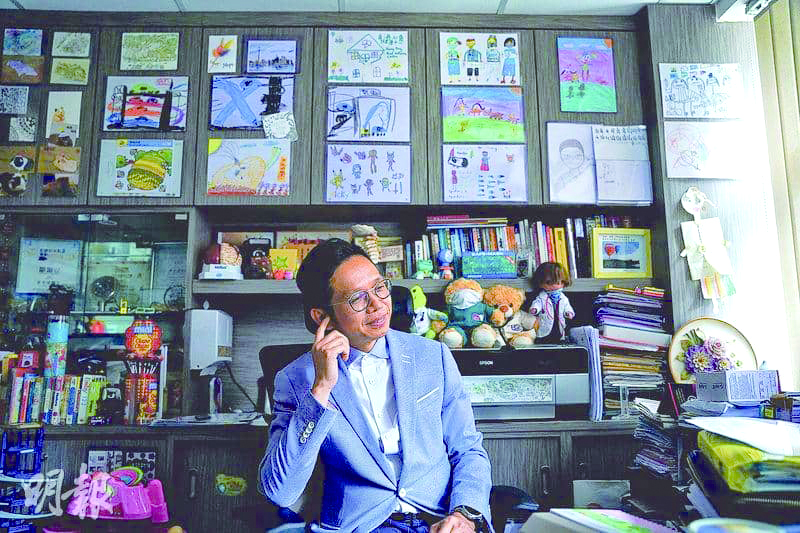[Wan Qing Yi Nursing Care]The physical and mental wounds of those who have been infected with SARS and recovered
[ad_1]
Text: Lucy
Twenty years ago, in February 2003, SARS silently infiltrated Hong Kong and mercilessly took the lives of 299 people in just a few months. A total of 1,755 people were infected, including the then 47-year-old ambulanceman He Jinhua.
Twenty years later, in the spring, while the memories and fears of the SARS survivors have not faded away, Hong Kong people have gone through another new crown epidemic that lasted more than three years on the road.
(Hong Kong News) No matter how the years go by, how to get out of the haze of the body and mind is still a lifelong task for the SARS patients. The psychiatrists who are still walking side by side hope that the society will not Don’t forget the SARS patients. Assessment to understand the impact of the epidemic on the mental health of Hong Kong citizens.
Coronavirus awakens inner fear
After 17 years, the coronavirus came back to Hong Kong in 2020, awakening the fear in He Jinhua’s heart, “I was afraid before I got it (coronavirus), I don’t know what will happen if I get it, will it be like SARS, it will be inserted into the throat, enter the What about the ICU (intensive care unit)?”
Infected with SARS and Coronary Disease successively, he found that the symptoms of the latter were milder,
I also realize that the physical and mental trauma caused by SARS has not yet healed.
He Jinhua, 67 years old, traveled to Beijing with his wife in March 2003.
He was infected with SARS by a group member, and after returning to Hong Kong, he was admitted to Tuen Mun Hospital for 20 days of isolation.
The days of staying in the hospital are still imprinted in my mind,
He still remembers that when he was lying on the hospital bed, he heard the sigh of the patient in the same room,
The medical equipment emits sometimes sharp alarms, and the god of death is staring at himself outside the window.

Due to the shortage of thoracic doctors in Tuen Mun Hospital, Dr. Xie Wanwen, who was once the attending doctor of He Jinhua, volunteered to be transferred to the SARS ward. My people are all sick, so what should I do?”
dealing with anxiety alone
Later, Dr. Xie died of illness, and He Jinhua survived, but he had to struggle with physical and mental sequelae after he was discharged from the hospital. At that time, he saw a body that had lost nearly 20 pounds, and he was deeply afraid that his family would be infected, which caused him to suffer from insomnia.
After recovering, He Jinhua felt that his cardiopulmonary function was worse than that of ordinary people. After 17 years, he encountered the new coronavirus epidemic, which awakened his fear. He said that there was no vaccine or specific medicine in the early stage of the new crown, and he knew nothing about the fatality rate of the epidemic. He was worried that the scene of breathing oxygen would reappear after the epidemic. , Once insomnia.
However, under the epidemic, the psychologist he had been seeing for a while temporarily suspended consultations. In order to avoid his family’s worries, he chose to deal with his uneasy emotions alone, avoided sad news, deliberately reduced going out, and kept his distance from people when he entered the elevator. When the epidemic slowed down, I caught the epidemic when I went to a hotel with my family for a “staycation”.
Coronavirus is like a cold
Ho Kam Wah, who used to be anxious about the Corona virus, only suffered from “cough” and bone pain after contracting the disease. He described the Corona virus as like a fever and a cold, and joked that worrying too much brought him emotional problems. In order to avoid infecting his granddaughter, he applied to stay in the Penny’s Bay isolation camp; compared to the old SARS ward, he said, “Bad Bay” no longer has critically ill patients panting, and he no longer worries about infecting medical staff, describing the experience of isolation alone” Seems to be better.”
Time flies, and it has been 20 years since SARS hit Hong Kong. He Jinhua, who is also a director of the Hong Kong SARS Mutual Aid Association, said that healing the physical and mental trauma caused by SARS is the lifelong task of all the recovered people.
The reporter interviewed him on a sunny noon. At the end of the conversation, he sighed indifferently. Re-talking about the SARS experience seemed to bring him back to 2003, and that night would be another sleepless night for him. .

Taking care of mental health Let’s not forget the recovered SARS patients
In the spring of 2003, a SARS epidemic passed by in a hurry, but left pain in the hearts of many people.
Mai Yongjie, a psychiatrist who is currently in private practice, was an associate consultant psychiatrist at United Hospital at that time, and he had accompanied more than 100 SARS survivors through difficulties.
After leaving the public hospital, even though he changed his identity, he became friends with many recovered patients. He continued to share joys and sorrows over the years, and witnessed the new crown epidemic touching their wounds again.
In the blink of an eye, 20 years later, he lamented that many Hong Kong people gradually forgot about SARS.
Coronavirus sparks fear among survivors
Mai Yongjie, who is an honorary consultant of the Hong Kong SARS Mutual Aid Association, still regularly gathers with “SARS friends” at annual dinners and activities to support each other and talk about the past and recent developments after leaving the public hospital. Many of the rehabilitators he followed up in the past have become friends, and some female rehabilitators are still affected by bone decay. At the beginning of the outbreak of the coronavirus, he received a text message from her reminding him to take precautions.
“Post-traumatic sequelae are like a scar that has always existed and will gradually fade over time, but sometimes it still hurts when touched.” Mai Yong said that many people who recovered from SARS suffered from post-traumatic sequelae. The outbreak of the epidemic brought back the memories of SARS in many recovered patients. Some people even had “flashbacks”. At the beginning of the epidemic, they chose not to go out, washed their hands frequently, and avoided watching TV and news.
In just 3 months of SARS, the coronavirus has turned into a pandemic, which lasted more than 3 years. However, Mai Yong said that SARS (Severe Acute Respiratory Syndrome) was as its name suggests. The society is “hopeless and helpless”, and the impact and trauma on patients are felt to be deeper.
Affects mental health of all walks of life
However, he believes that the COVID-19 epidemic has been longer and has experienced social distancing measures, school suspensions, and severe economic losses. It has a wider impact on the mental health of all walks of life. It is worthy of the government’s post-epidemic evaluation to understand the impact of the epidemic on the mental health of Hong Kong citizens.
“Sometimes I feel that I can heal them, and I have gained a lot. I have learned a lot from seeing a doctor and watching life.” Mai Yong said that besides reminding him that health and family are the most important things for the recovered SARS patients, their injuries The painful experience is just reminding the society and the world that when dealing with the epidemic, we should not only take into account the physical health of the patients, but also take into account the mental health.
After twenty springs, should we forget or remember the SARS battle? Mai Yong went on to say that if it is not necessary, many recovered people are reluctant to bring up the past. He remembers singing “Try to remember” at the SARS Mutual Aid Association dinner one year, and the song conveyed the meaning, “You don’t need to mention it (SARS) often, but if it’s okay, you can try to remember it. I hope that one day when you think about it, it won’t affect your emotions. alright.”
[ad_2]
Source link

![[Love Wants Sexual Happiness Series 358]Find the culprit and overcome psychogenic erectile dysfunction. Don’t let pressure affect your sexual happiness.](https://chinathenews.com/wp-content/uploads/2024/04/171111-780x420.jpg)

![[Wanqingyi Care]My health, my rights, customized medical methods in the last stage of life](https://chinathenews.com/wp-content/uploads/2024/04/ZZ1-100-780x420.jpg)
![[Kidney Transplantation Special Topic]The survival rate of transplanted kidneys is high without dialysis treatment three times a week](https://chinathenews.com/wp-content/uploads/2024/04/1311-780x420.jpg)



